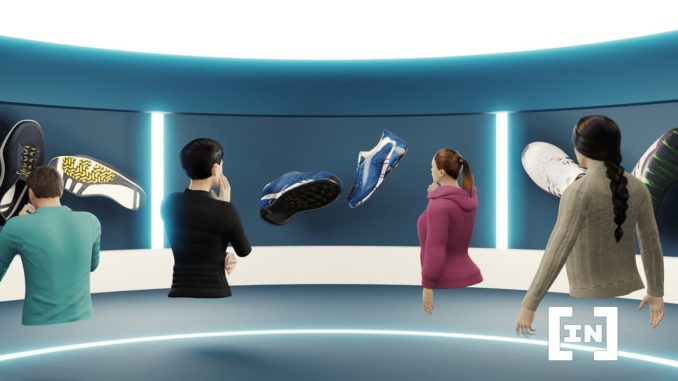
Selling in the Metaverse: Virtual showrooms exist in the Metaverse, they are available around the clock 365 days per year. Now is the time to get on board, says David Keane, CEO and Co-Founder of Bigtincan.
The rise of the Metaverse and Web 3.0 marks an exciting time for the future of sales enablement. Put away your bland product displays and static training materials. Say goodbye to outdated sales portals and legacy LMS systems. Forget the ad-hoc coaching approach from your old sales enablement playbook. The evolution of digital innovation is opening a wide range of game-changing possibilities for sales organizations to capitalize on.
Forbes and JPMorgan forecast that the Metaverse will emerge across key sales sectors over the next several years, in turn creating an annual $1 trillion in profit potential. And according to a recent KPMG pulse report, nearly two-thirds of consumers are now familiar with the metaverse and ready to use it for engaging and interacting with brands.
With the nature of buyer-seller interactions increasingly going digital, the buying experience of the future will exist inside the Metaverse. In response, B2B sellers need the right sales enablement tools and training to proactively engage prospects in virtual environments.
This is where enterprise-grade Web 3.0 technologies will serve a critical purpose – enabling sellers to deliver immersive and personalized virtual buying experiences that lead to smart purchasing decisions and brand loyalty.
The Basics Behind the Metaverse and Web 3.0
The widespread hype surrounding the Metaverse has turned it into a confusing phenomenon, but the concept behind it from a sales enablement standpoint is surprisingly simplistic. An accurate way to describe it is like a continuous virtual ecosystem where brands and customers can interact by leveraging Web 3.0 extended reality (XR) technologies such as:
Virtual Reality (VR): An immersive, fully rendereddigital environment that replaces a real-life environmentAugmented Reality (AR): An interactive experience overlaying digitally-enhanced content into real-life environmentsMixed Reality (MR): A seamless blend of both AR and VR in which physical and virtual environments co-exist in real-time
Over the next five years, Gartner predicts that 1 in 4 people will spend at least an hour in the Metaverse each day for either work, shopping, education, and entertainment. In addition, 30% of global enterprises will have products and services ready for the metaverse as well. The organizations that are first to realize XR’s potential across sales enablement today will be the first to reap its benefits tomorrow.
Selling in the Metaverse: Web 3.0 for Immersive Virtual Buyer Engagement
By integrating the use of XR technologies within customer-facing sales content, sellers can interactively engage buyers for a deeper level of understanding. Instead of traditional sales content and product demos that fail to constructively inform buyers, XR technology brings products to life through 3D models and immersive virtual displays that promote multi-sensory learning.
With AI-driven virtual showrooms for example, sellers can leverage AR and VR to create, manage, and display immersive sales content that allows buyers to interact with the product as if it were right in front of them.
Since virtual showrooms exist in the Metaverse, they are available around the clock 365 days per year – allowing buyers to learn at their own pace when the timing is right for them. The unrivaled levels of personalization and immersive engagement at every touchpoint of the buyer’s journey help simplify complex purchasing decisions.
Selling in the Metaverse: Personalized Virtual Training and Coaching
In a similar realm, Web 3.0 technologies can empower organizations to develop virtual buyer-ready sales teams through interactive training integrated within a sales enablement platform. The MR-powered, 3D content essentially replicates buyer interactions that sales reps will experience in the Metaverse, in turn enabling them to practice communication techniques and tactics that help promote positive buyer engagement.

Each simulation is tailored to the individual seller and tracked in real-time using AI-driven voice analysis that measures their performance. Then, managers can leverage the automated insights to provide personalized coaching to streamline professional development.
From engaging buyers with virtual product displays to coaching sellers with interactive training content, enterprise-grade XR tools should be considered must-haves for your sales enablement platform. The Metaverse is already on the horizon. Ensure your business is ready to capitalize on it.
About the author

David Keane serves as the CEO and Co-Founder of Bigtincan – a global leader in sales enablement automation. With more than 20 years of B2B and B2C technology experience, Keane is on a mission to help global brands shape the buying experience of the future through AI-powered sales enablement solutions. His vision and leadership guided Bigtincan on its meteoric rise from 2010 startup to a publicly-traded market leader surpassing $100m in revenue in 2021. Prior to Bigtincan, Keane founded Quadtel Asia in Singapore and Veritel Wireless in Australia and had previously run intentional operations for Web startup Kgrind.com, growing and managing their business over three continents. Originally from Australia, Keane earned his Bachelor’s Degree in Economics from the Australian National University and an M.A. in Management from Macquarie University.
Got something to say about selling in the metaverse or anything else? Write to us or join the discussion in our Telegram channel. You can also catch us on Tik Tok, Facebook, or Twitter.
Disclaimer
All the information contained on our website is published in good faith and for general information purposes only. Any action the reader takes upon the information found on our website is strictly at their own risk.






Be the first to comment